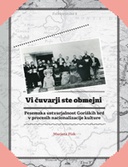Explore

The book describes the role of singing and (folk) songs in the Gorizia Hills (Goriška brda) within the processes of shaping the political nation and facilitating national identification in the second half of the nineteenth century. In addition to the use of the Slovene language at school and church and defining Slovene as the language of common use in censuses, national activists encouraged inhabitants to express identification with the singing of Slovene “folk” songs. Therefore they promoted the performances of choirs and tried to sweep-out the singing of non-Slovene songs - especially Friulian and Italian. The singing outside the reading and singing societies was influenced by the way of life, which was strongly marked by the system of tenant farming. The book also presents the research of folk songs in the Gorizia Hills, with special emphasis on short songs with strong dialect features, which in everyday life of the inhabitants complemented the repertoire of folk and religious songs known in the wider Slovenian territory.
This book is included in DOAB.
Why read this book? Have your say.
You must be logged in to comment.
